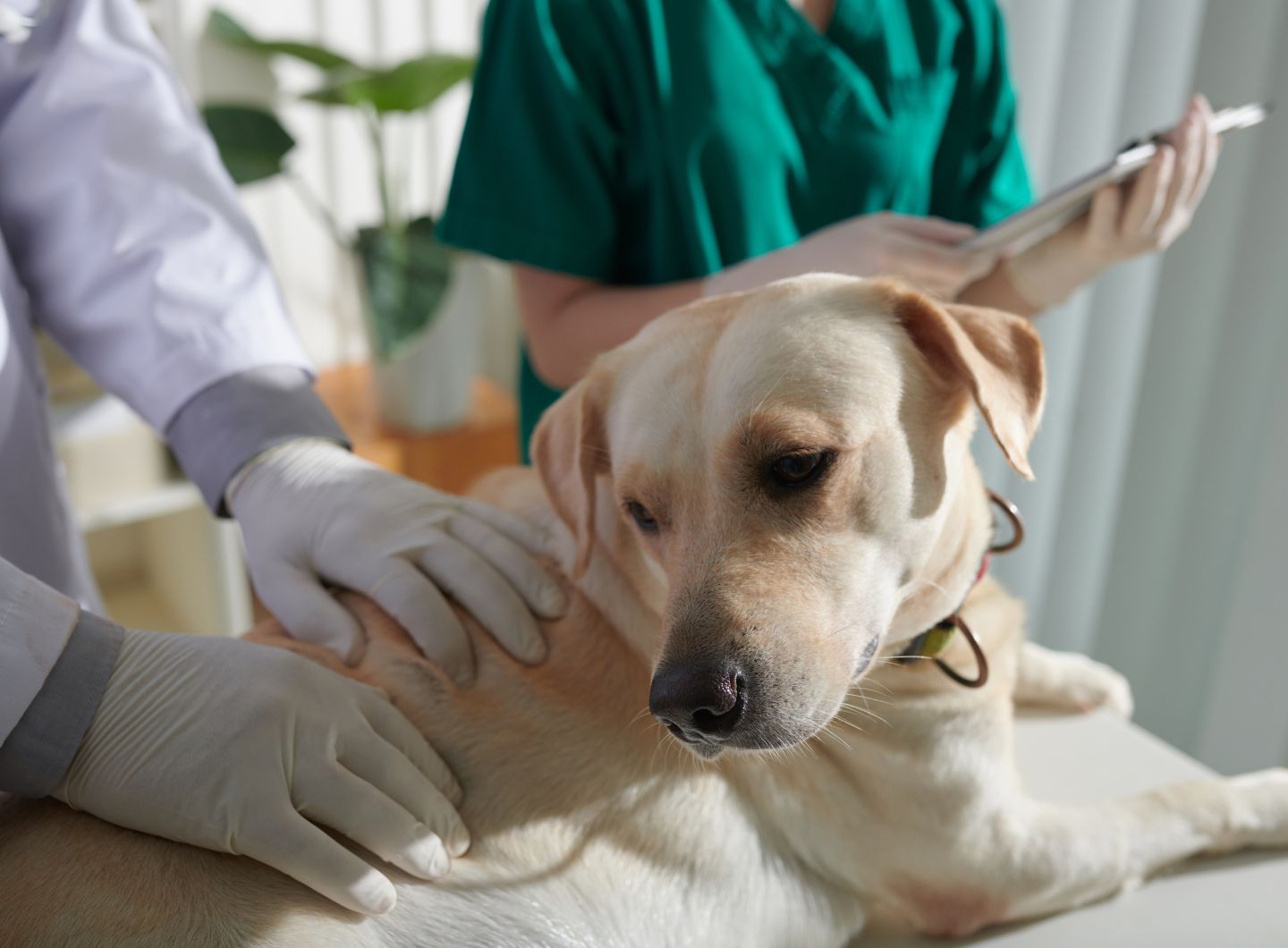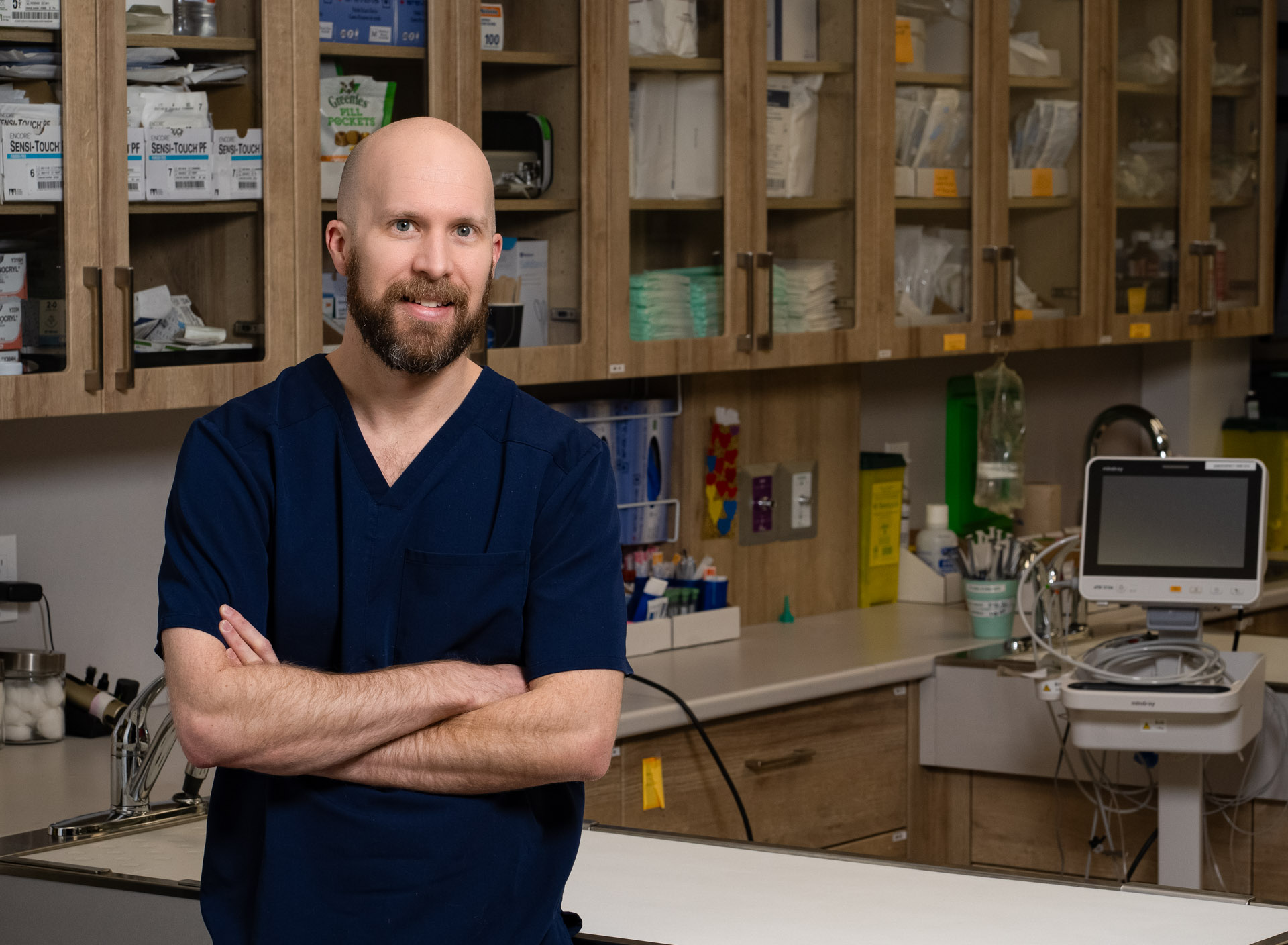Who is a Veterinary Cardiologist?
A veterinary cardiologist is a board-certified specialist in diagnosing and managing conditions of the heart and circulatory system. Cardiologists undergo extensive training to acquire the specialized skills to diagnose and treat cardiovascular diseases. This involves completing veterinary school to become a veterinarian (4 years), an internship program (minimum of 1 year), and an approved cardiology residency training program (3-5 years). After this training, the veterinarian must complete and pass multi-day written and practical examinations to become a board-certified veterinary cardiologist. Our cardiologist, Dr. Christopher Whipp, is board-certified in cardiology by the American College of Veterinary Internal Medicine (ACVIM).

Our Cardiology Specialists

Dr. Chris Whipp
Learn More »
When Should Your Pet See Our Cardiologist?
Dr. Whipp is willing to see your pet anytime they have a cardiac or cardiovascular concern. We accept referrals from primary care veterinarians and self-referrals directly from owners. Some of the more common changes that warrant concern are:
- Coughing and difficulty breathing
- Exercise intolerance (slowing down or getting more tired on walks or when playing)
- Weakness or collapse
- Bloating or swelling of the abdomen
What Are Some of the Common Conditions Our Cardiologist Treats?
- Congestive heart failure
- Diseases of the heart muscle (e.g., dilated cardiomyopathy and hypertrophic cardiomyopathy)
- Diseases of the heart valves (e.g., degenerative mitral valve disease)
- Congenital (present at birth) heart defects (e.g., patent ductus arteriosus, pulmonic valve stenosis, etc.)
- Congenital vascular diseases (e.g., portosystemic shunts)
- Cardiac arrhythmias (heart rate or rhythm abnormalities)
- Diseases of the pericardium (e.g., pericardial effusion)
- Infectious cardiac diseases (e.g., heartworm)
- Cardiac tumors
- Hypertension (high blood pressure)
- Pulmonary hypertension (high blood pressure in the lungs)
- Tumor embolization in consultation with our medical oncology and surgical oncology teams
What Are Some of the Tests Our Cardiologist Uses for the Diagnosis and Monitoring of Cardiovascular Conditions?
- Electrocardiography (ECG) to provide a reading of the heart rhythm
- Electrocardiography, which is an ultrasound of the heart
- Blood pressure evaluation
- Radiographs (x-rays) of the heart and lungs
- Holter monitoring, which is a 24-hour ECG at home
- Contrast-enhanced CT scan for assessment of cardiovascular diseases, such as portosystemic shunts
What Are Some of the Common Surgical Procedures Our Cardiologist Performs?
- Interventional coiling of congenital cardiac defects (e.g., patent ductus arteriosus)
- Interventional coiling of congenital vascular diseases (e.g., intrahepatic portosystemic shunts)
- Balloon valvoplasty to dilate narrowed heart valves
- Pacemaker implantation to control heart rate and rhythm abnormalities
- Pericardiocentesis for management of pericardial effusions
What Should You Expect When Booking an Appointment with Our Cardiologist at Capital City Specialty & Emergency Animal Hospital?
If your primary care veterinarian is referring your pet, we will contact you as soon as possible to schedule your appointment. If you are doing a self-referral for your pet, please either call (613 244 7387) or email (at cardiology@capcityvet.com) our team directly. One of our team members will schedule you into the next available appointment slot. Our regular schedule is Monday to Thursday from 8 a.m. until 5 p.m. Please call the hospital immediately if you require an urgent appointment.
On the day of your appointment, you and your pet will be checked in at reception and brought to the cardiology examination room. Dr. Whipp will discuss your pet’s history with you and thoroughly examine your pet’s heart and vascular system. He may suggest additional tests to evaluate your pet’s condition further if indicated. This commonly includes blood pressure measurements and an ECG but may consist of other tests depending on the investigated condition.
After this examination, Dr. Whipp will thoroughly discuss the findings with you and make a treatment plan that best suits your pet, their condition, and your involvement. The entire process will take approximately 60-75 minutes.
If medications are required, a treatment plan and medications will be sent home with you with detailed instructions. If surgery is also required or recommended, you will review this thoroughly. Anesthesia will be provided and monitored by our board-certified anesthesiologist, Dr. Matt Milloway, and his team for the best and safest care possible.
A thorough report will be sent to you and your primary care veterinarian, including Dr. Whipp’s examination findings, diagnosis, treatments, follow-up recommendations, and a review of the conditions/diseases. This will ensure that we are all included as a team to provide continuity of care for your pet.
Dr. Whipp eventually plans to offer OFA Heart Registry Certificate exams, but this will be later.
We strive to provide you and your pet with the highest level of care. We love what we do, we love our patients, and we treat them as if they were our own.


